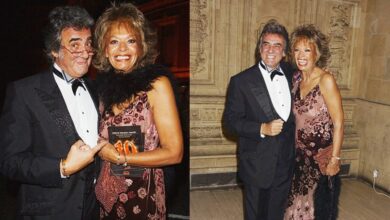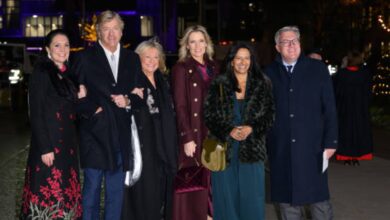Oakley Neil Caesar-Su: A Deep Dive into Ethnicity, Faith, and the Woman Behind the Music

Oakley Neil H.T. Caesar-Su, better known by his stage name Central Cee, has become one of the most recognizable voices in the UK rap scene. Known for his emotionally driven lyrics, distinct vocal tone, and genre-blending sound, Central Cee has rapidly risen to fame. While his music is now heard around the world, there’s a profound story behind the artist — a story rooted in his rich ethnic background, ambiguous religious identity, and an unbreakable bond with his mother, Rachel Caesar.
This article explores the depth of Oakley Neil Caesar-Su’s heritage, religious context, and his relationship with the woman who raised him — Rachel Caesar.
Origins: A Star Is Born in West London
Oakley Neil Caesar-Su was born on June 4, 1998, in Ladbroke Grove, West London, and raised in the culturally diverse neighborhood of Shepherd’s Bush. Growing up in this area exposed him to a melting pot of cultures and sounds, which would later seep into the musical texture of his songs.
West London is known for its multiculturalism — from Caribbean influences to North African communities, to South Asian and Irish enclaves. It is a part of London where identity is fluid, and heritage becomes a tapestry of lived experience. For Central Cee, this environment was fertile ground for self-expression.
Ethnicity: A Rich Multicultural Tapestry
Oakley’s ethnic background is a compelling mix. His mother, Rachel Caesar, is of Irish descent. She was born and raised in a traditional Irish household in London, and attended boarding school, reflecting the upper-middle-class values of her upbringing. Her family was reportedly well-off, but Rachel’s teenage romance with a man of mixed heritage disrupted her place in the family.
Central Cee’s father is of Guyanese and Chinese descent, with some sources suggesting he may also have Ecuadorian and Arawak roots. This makes Oakley one of the most ethnically diverse figures in the UK music industry today. His identity represents a confluence of Western European, South American, Afro-Caribbean, and East Asian lineages.
This multicultural heritage profoundly shapes both his appearance and his worldview. In interviews and lyrics, he has referenced the complexity of identity and the feeling of existing between worlds — not quite fitting into one specific ethnic box, but embodying many cultures at once.
This mixed identity also allows him to resonate with a broader audience, especially in a globalized music landscape where cultural hybridity is increasingly celebrated.
Religion: A Quiet Spiritual Undertone
When it comes to religion, Oakley Neil Caesar-Su has remained largely private. He has never publicly confirmed a specific religious belief. However, some online speculation and hints in his content and social media activity suggest a potential link to Islam.
In September 2023, Central Cee posted an Instagram story that featured an Arabic phrase: “A’udhu billahi min ash-shaytan ir-rajim” — meaning “I seek refuge in Allah from the accursed Satan.” This Quranic verse is often recited by practicing Muslims. While this does not confirm a formal religious alignment, it suggests a spiritual curiosity or cultural respect for Islamic traditions.
Still, without direct confirmation from Central Cee, any claim about his religion remains speculative. What is clear, however, is that themes of morality, justice, loyalty, and inner conflict — themes deeply embedded in many religious traditions — frequently appear in his lyrics.
Rachel Caesar: The Silent Architect
One cannot discuss Oakley Neil Caesar-Su without paying homage to his mother, Rachel Caesar. She is not only biologically essential to his existence, but emotionally and psychologically instrumental to his development as a person and an artist.
Rachel Caesar’s life took a turn when she fell in love with Oakley’s father at the age of 15. Her relationship with a man from a different cultural and ethnic background led to a break with her own family. She was financially cut off and forced to grow up quickly, all while raising children in a far less secure environment than she had known.
After separating from Oakley’s father when Oakley was just seven years old, Rachel raised him and his siblings on her own in West London. Despite the financial and emotional difficulties, she remained deeply supportive of her children’s passions. She saw early on that Oakley had a gift for rhythm, poetry, and expression — and she did not dismiss these as trivial hobbies.
In fact, it was Rachel’s belief in her son’s talent that laid the groundwork for his later confidence and drive. In interviews, Central Cee often mentions the influence of his mother — not in a cliched, passing way, but as a cornerstone of his life.
The Cultural Influence of Rachel Caesar
Being Irish, Rachel brought a cultural discipline and resilience that comes from generations of struggle and survival. Irish history is steeped in stories of displacement, poverty, and cultural resistance — all themes that resonate with Central Cee’s own lyrical content.
At the same time, Rachel was open to the cultural influences that came from her partner and community. She did not try to force her children into a monolithic identity. Instead, she allowed them to experience the full spectrum of their cultural makeup — Irish, Caribbean, Chinese, possibly Ecuadorian — and to make sense of it in their own way.
Her openness helped Oakley craft a unique narrative voice in his music — one that isn’t confined to a single identity, but rather speaks to a shared experience of multicultural London.
Music as a Reflection of Identity
Central Cee’s music is a mirror of his identity — and by extension, a reflection of Rachel’s nurturing and cultural worldview. His lyrics touch on themes like broken homes, street survival, emotional suppression, and longing for authenticity.
His ability to jump between melodic hooks and introspective verses is perhaps symbolic of his fluid cultural identity. In a world where rigid categories are often imposed, Central Cee — and by association, Rachel Caesar — represent the power of embracing complexity.
Conclusion: The Strength Behind the Star
Oakley Neil Caesar-Su is more than just a chart-topping rapper. He is a product of cultural confluence, maternal strength, and self-driven resilience. His ethnic makeup is both wide-ranging and deeply rooted — spanning from Ireland to China, from Guyana to potentially Ecuador. His religious identity remains private, though spiritual undertones appear in his public expressions.
At the core of it all is Rachel Caesar — a woman who defied societal expectations, raised her sons in adversity, and quietly paved the way for her child to become one of the most significant voices in modern British music.
Oakley Neil Caesar-Su’s story is still unfolding. But if there’s one truth that stands tall, it’s that identity is never singular — it is layered, complex, and ever-evolving. And sometimes, the most powerful chapters are written not by the person in the spotlight, but by those who believed in them long before the world did.




